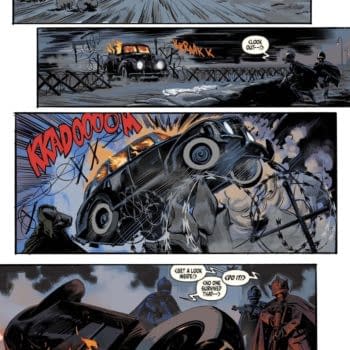Posted in: Sports, TV, WWE | Tagged: Vince McMahon, wrestling, wwe
Vince McMahon Hit With Class Action Lawsuit Over WWE Power Play
A class action lawsuit on behalf of WWE shareholders has been filed against Vince McMahon following his return to power & plans to sell WWE.
Vince McMahon's return to power in WWE has been going pretty well for him so far. McMahon was forced to retire last year over sexual misconduct accusations and investigations into hush money payments to the accusers, but he returned with a vengeance to kick off 2023, using his majority stockholder voting power to elect himself Chairman, effectively oust his detractors and initiate a sale of the company, possibly for a ton of money from Saudi Arabia. But it's those actions that have caused McMahon to be the subject of a class action lawsuit filed on behalf of shareholders by another shareholder, alleging that McMahon "breached his fiduciary duties as a controlling stockholder" and that his method to regain power violated Delaware Law.

Bloomberg Law first reported the lawsuit and posted the legal filing online, which you can read here. The filing recaps McMahon's scandal and retirement last year before getting into the details of his power grab. The lawsuit accuses McMahon of attempting to "hold the Company hostage" by stating his intent to block a new media rights deal if he wasn't allowed to return.
In late December 2022, McMahon demanded in writing that the Board invite him back to serve as Executive Chairman. McMahon insisted that he guide a strategic review process as Executive Chairman or else he would hold the Company hostage. He asserted that he would interfere with and withhold support or approval of any process that he did not lead. McMahon further threatened to withhold his support of any negotiation respecting WWE's expiring media rights deals. WWE's media rights are the Company's lifeblood. The media right agreements were set to expire in 2024 and were slated for renegotiation in early 2023.
The lawsuit notes that the board, including McMahon's daughter and then-Chairwoman, Stephanie McMahon, voted unanimously against his return. However, as we all know, and as the filing recounts, McMahon then "took matters into his own hands" by using his 81% majority voting power to force his way back in, amending the company bylaws, replacing three board members with himself and two others, and amending company bylaws to give himself, amongst other powers, the right to block media deals and attempts by the board to reassert power. All of this was laid out in the SEC filing detailing the changes that we analyzed earlier this week. In the wake of McMahon's return, three additional board members have resigned, including Stephanie McMahon.
The filing notes:
By his Written Consent, McMahon seeks to hamstring the Board and prevent it from undertaking significant time-sensitive decisions respecting some of the most important properties of the Company. He also leveraged that purported blocking power to get himself reappointed as Executive Chairman of the Board.
However, it claims that McMahon doesn't have the power he used to implement his plan:
McMahon lacks the power he purported to wield. Section 141(a) of the Delaware General Corporation Law (the "DGCL") recognizes the inviolability of the board of directors' power to make significant decisions respecting the business and affairs of the Company. The Board members have an unremitting obligation to discharge their fiduciary duties.
The lawsuit then declares:
Through this Action, Plaintiff seeks a declaration that the Stockholder Approval Amendment impinges upon the Board's core functions and is therefore void and invalid and that McMahon has breached his fiduciary duties as a controlling stockholder.
The lawsuit asks the court to provide relief in the following ways:
A. Declaring that this Action is properly maintainable as a class action;
B. Declaring that McMahon breached his fiduciary duties;
C. Declaring that the Stockholder Approval Amendment violates the DGCL and the Charter;
D. Invalidating the Stockholder Approval Amendment;
E. Awarding Plaintiff the costs, expenses, and disbursements of this action, including all reasonable attorneys', accountants' and experts' fees; and
F. Awarding such other relief as this Court deems just and equitable.
Whether the lawsuit will be successful or if it will delay McMahon's plans to sell the company remains to be seen. Read the full thing at the link above for a lot more details and legalese.















